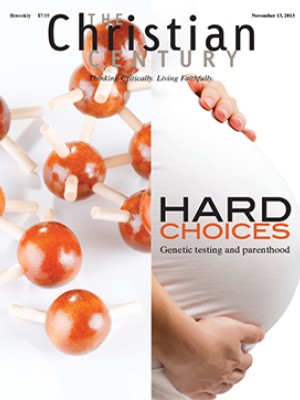Christians without church
This spring my daughter and only child, Jesselyn, will turn 26. She and her husband live in the Chicago area, so my wife and I are blessed to be able to share meals with them, visit street fairs in their neighborhood and ask them to dog-sit for us. We take in movies together, go on walks and celebrate birthdays and holidays.
As a parent, it is a delight to say that Jesselyn has turned out to be a lovely and talented woman. She pursues editorial work. She cooks and bakes avidly and expertly. She sews. She reads and listens to music and is a loyal devotee of National Public Radio. She is a lively conversationalist on books, movies, television shows, Japanese anime, and politics. In short, her company is to be treasured.
Read our latest issue or browse back issues.
But I have not yet said the most important thing I can say about Jesselyn: she is baptized and was raised in the church. Though Jesus certainly prized his family, he was clear that the highest priority was allegiance to God and discipleship.
In a passage in my Bible with the subhead “The True Kindred of Jesus,” Jesus’ family asks for him. “A crowd was sitting around him; and they said to him, ‘Your mother and your brothers and sisters are outside, asking for you.’ And he replied, ‘Who are my mother and my brothers?’ And looking at those who sat around him, he said, ‘Here are my mother and my brothers! Whoever does the will of God is my brother and sister and mother’” (Mark 3:31–35).
Paul likewise suggests that the most significant social role Christians inhabit is that conveyed by virtue of their baptism. Rendering secondary the most determinative social and ethnic roles of his day, he follows a statement on baptism with the declaration that in Christ “there is no longer Jew or Greek, there is no longer slave or free, there is no longer male or female, for all are one in Christ Jesus” (Gal. 3:28). I have taught Jesselyn, then, that she is not only my daughter but my sister in baptism.
We have many rich memories of experiences in the church. When Jesselyn was a toddler and we were awaiting worship, the priest passed by in his cassock. “There goes my Jesus,” she said fondly.
We worship at a congregation named St. Barnabas Episcopal Church. When Jesselyn was young we would often visit a local bookstore after Sunday services. Someone asked Jesselyn where she went to church. “St. Barnes and Noble,” she replied.
Once we had friends over for a dinner party and someone mentioned the Eucharist. Jesselyn, then in late grade school, asked what that was. “What kind of Episcopalian are you,” I teased, “if you don’t know what the Eucharist is?”
She shot back, “What kind of theologian are you if your daughter doesn’t know what the Eucharist is?” (Later she admitted that she was fully aware of the Eucharist and its meaning.)
When Jesselyn was in high school, she sang in the church choir and was an acolyte. I asked her if she would be comfortable if I joined the acolytes. She readily agreed, and I vastly enjoyed serving with her in that capacity. (At age 56, I’m still an acolyte.)
Like many people her age who were raised in the church, she and her husband are not regular churchgoers. They say they will attend church regularly once they have children. My wife and I have gently urged: Why not get in the habit now?
What difference does it make? After all, Jesselyn is a Christian in the deepest sense of the word (she is baptized and regularly prays) and also in the most superficial sense (if a pollster asked for her religion, she would identify herself as a Christian). The difference it makes, I think, is that being a Christian in the fullest accounting includes participation and growth in the corporate body of Christ. And she is missing out on the challenge and comfort that comes from the regular celebration of the Eucharist.
So we wait and hope for Jesselyn to return to vital participation in the church—and for new ecclesial memories to be made with my daughter, and my sister in Christ.







